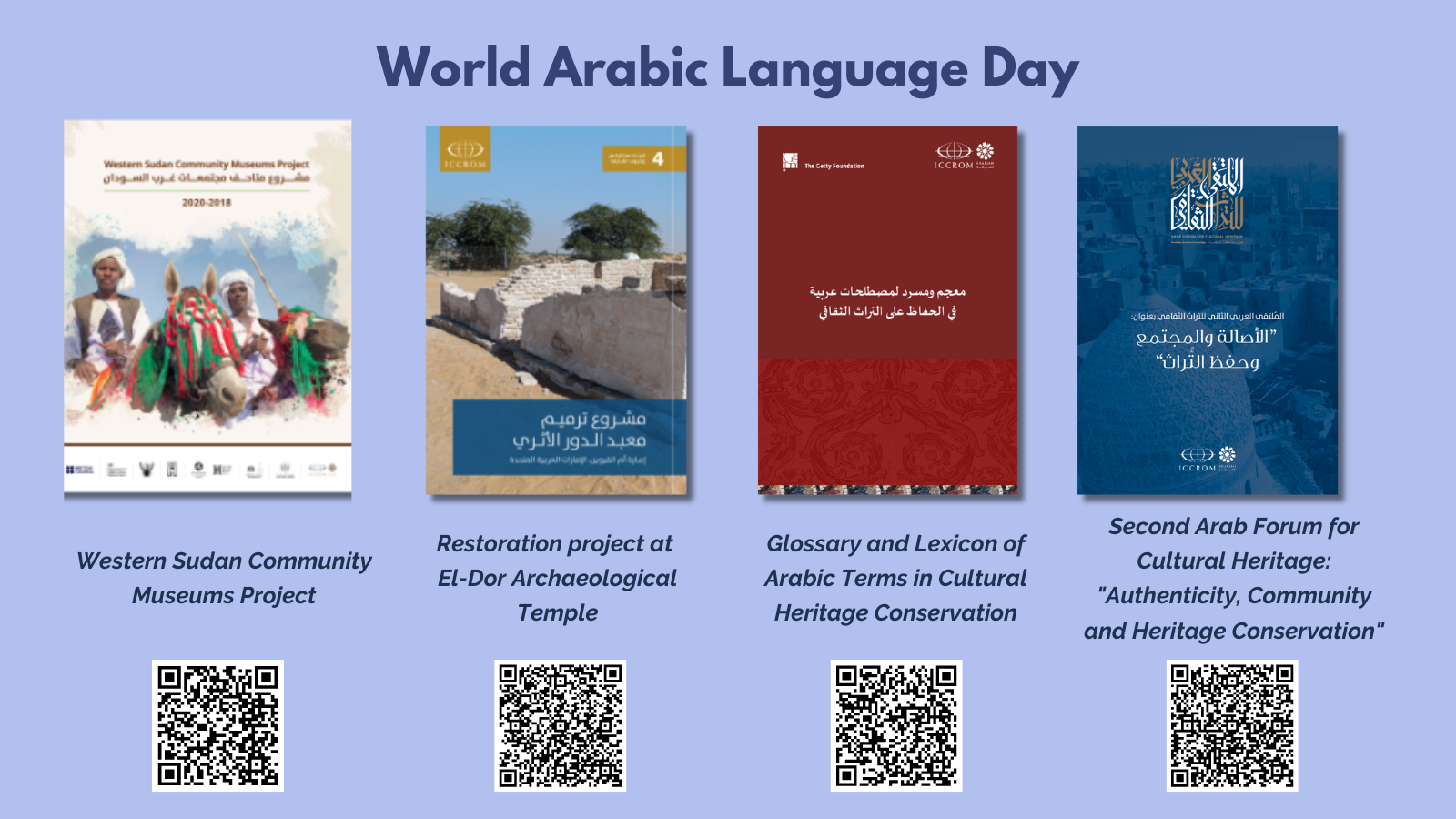Language is an important part of our intangible heritage. Every year on 18 December, the international community celebrates Arabic Language Day in honour of the culturally rich and poetic language spoken by more than 400 million people every day.
This year is even more special – it marks 50 years since Arabic was made an official United Nations language!
We are joining the international festivities by highlighting some of our most recent publications available in Arabic. The language is an important part of ICCROM’s work, with our Regional Office located in the United Arab Emirates and serving the entire Arabic-speaking world.
Here are just a few examples of Arabic-language resources and publications released by the ICCROM Sharjah Regional Office in Sharjah over the past year:
- Restoration project at El-Dor Archaeological Temple This book is an example of balancing real-world challenges and heritage conservation constraints by international conventions. It is aimed at project managers and restorers working in laboratories or sites who are interested in learning about scientific techniques and analyses that can be applied in similar restoration works. As a highly specialized field of expertise, the implementation of this project paid great attention to preserving the authenticity of the monument and raising awareness about the temple’s cultural value, meaning and history.
- Glossary of Arabic Terms for the Conservation of Cultural Heritage This glossary of cultural heritage conservation terminology, intended for conservation professionals working in the Arab region, is a preliminary document distributed to invite discussion and comments. It complements a glossary of technical terms published in “Readings in the Conservation of Mosaics." Available in Arabic-English and English-Arabic. This publication was a joint project between ICCROM-Sharjah and the Getty Foundation.
- Second Arab Forum for Cultural Heritage: "Authenticity, Community and Heritage Conservation" This publication provides an overview of the characteristics of cultural heritage in the Arab region, including the specificity and diversity of heritage and the notion of authenticity in an Arab architectural and urban context – namely, its association with ideological understandings of heritage and its relation to history and language. The Second Arab Forum’s proceedings provide helpful case studies that raise prominent issues about authenticity and contemporality, highlighting the role of cultural institutions in engaging the community. It also touches on living heritage’s sociocultural dimensions and enhancing cultural dialogue by comparing global, regional and local perspectives.
- The Western Sudan Community Museums Project This multilingual publication (Arabic and English) provides a record of the Western Sudan Community Museums (WSCM) Project activities, which link the theoretical and philosophical aspects of heritage protection with their practical application. The project set out to include local communities and their living heritage within the context of three nationally governed museums that share regional history, culture and geography. This publication was a joint project between ICCROM-Sharjah and Mallison Architects.
- A Decade in Review: ICCROM-Sharjah This brand-new report commemorates and reflects upon the first decade of the ICCROM Sharjah Regional Office's impact in the Arab region. It is a review of how the ATHAR programme, led by ICCROM-Sharjah, has evolved and grown over the last ten years, recording its achievements and outlining the strategies and approaches employed for the conservation, advancement and coordination of cultural heritage policy and practice in the Arab region. Though it is only available in English at the moment, the Arabic version is coming very soon!
We offer many more resources in Arabic, including some of ICCROM’s most consulted publications, and several translations will be coming out soon, including “Protective Shelters for Archaeological Sites" and "International Charters for the Conservation and Restoration of Monuments and Historic Sites," to further enrich our Arabic-language collection.
Check out all our publications.

